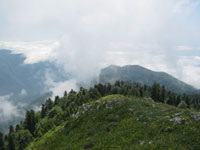Russian Recognition of South Ossetia and Abkhazia: New Political Reality
On August 25, 2008 the Federal Assembly of Russia unanimously voted to urge President Medvedev to recognise Abkhazia and South Ossetia as independent states. On the following day, President Medvedev agreed, and signed a decree in which Russia officially recognized the two entities.

Georgia has rejected Russia's move. Deputy Foreign Minister of Georgia, Giga Bokeria said: "This is an unconcealed annexation of these territories, which are a part of Georgia."
On August 26, 2008 Russian President Medvedev has instructed the foreign ministry to open talks with Abkhazia and South Ossetia on establishing diplomatic relations with Russia.
President Medvedev issued a statement saying: "This was not an easy choice to make, but it is the sole chance of saving people's lives" and calling on other countries to follow suit. In a televised address, he echoed the language of genocide used by Western leaders to describe Serbian attacks on Kosovo Albanians in 1999. Medvedev described Georgia in much the same way as Western leaders had once described Serbia.
Later, on August 26, a spokesman for the Palestinian group Hamas welcomed the diplomatic recognition of Abkhazia and South Ossetia. He said that there were similarities between the situations of the Abkhazian and South Ossetian people, and the Palestinian people. The spokesman said: "We, Palestinians, also struggle to attain recognition for our rights, the main of which is the right to be an independent state. We hope that the decision of Moscow becomes the beginning of recognition of peoples which combat for freedom and justice."
On August 28, Vasily Dolgolyov, the Belarusian Ambassador to Russia said that Belarus would in the next day or two recognise the independence of Abkhazia and South Ossetia.
The Russia's move was also supported by the Shanghai Cooperation Organisation, with China, Kazakhstan, Kyrgyzstan, Tajikistan and Uzbekistan issuing a joint statement vouching support for Russia's "active role" in resolving the conflict.
So far, no other recognized state has recognized them; however there have been intensive international disapprovals.
The unilateral recognition of South Ossetia and Abkhazia by Russia was met by much disapproval from some members of the international community and other members of the United Nations, the NATO, the OSCE, and the European Council.
The United States President George W. Bush condemned the actions taken by the Russian authorities and called on them to reconsider their irresponsible decision. President Bush also said "the two areas are within the internationally recognized borders of Georgia, and they must remain so."
The UK Foreign Secretary David Miliband accused Russian President Dmitry Medvedev of "inflaming" the crisis. He also called on Russia to stand by International Law as the basis for resolving this crisis and stated that he will assemble the "widest possible coalition against Russian aggression."
Eastern European capitals lined up in support of Georgia, with the Czech Republic in a statement calling Russia's action an attack on the independence, sovereignty and territorial integrity of Georgia.
The European Union leaders have condemned Russia's decision to recognise the Georgian breakaway republics of South Ossetia and Abkhazia, while Georgian rebels compared the move to the creation of Republic of Kosovo earlier this year.
The EU has tried to avoid parallels between Georgia separatism and the newly-created state of Kosovo in the past, saying Kosovo is "unique" despite the fact that 20 out of 27 EU states recognised its unilateral declaration of independence in February without an EU mandate.
Authorities in Abkhazia were happy to make the link, saying: "We use the same arguments as those used by the West with regard to Kosovo: All other possible means were exhausted. There was no possible way to reconcile with Georgia. This is purely a continuation of the Kosovo precedent. Of course some Western leaders will say that there is no link between Kosovo and Abkhazia and South Ossetia, but what can they say without contradicting themselves about what they said regarding Kosovo?"
The Ambassador of Russia to the NATO, Dmitry Rogozin, replied to accusations that Russia's recognition of Abkhazia and South Ossetia is "irreversible", but called upon the NATO countries to withdraw and review their recognitions of independent Kosovo and subsequently act on the premise that this is the new political reality. He assures, moreover that any NATO attack on Russia-supported regions would mean "a declaration of war on Russia".
In relation to the current event in Georgia, in Moldavia, Moldovan rebels called for independence of the breakaway territory of Transnistria.
Currently, 15 EU states are confronted with secessionism, including Germany, Spain, France, Italy, Belgium, Cyprus, Romania, Slovakia, and the UK, among others.
Question is: who is next?
Ivan Simic
Belgrade, Serbia
Subscribe to Pravda.Ru Telegram channel, Facebook, RSS!


